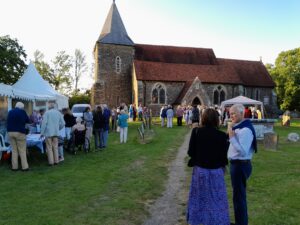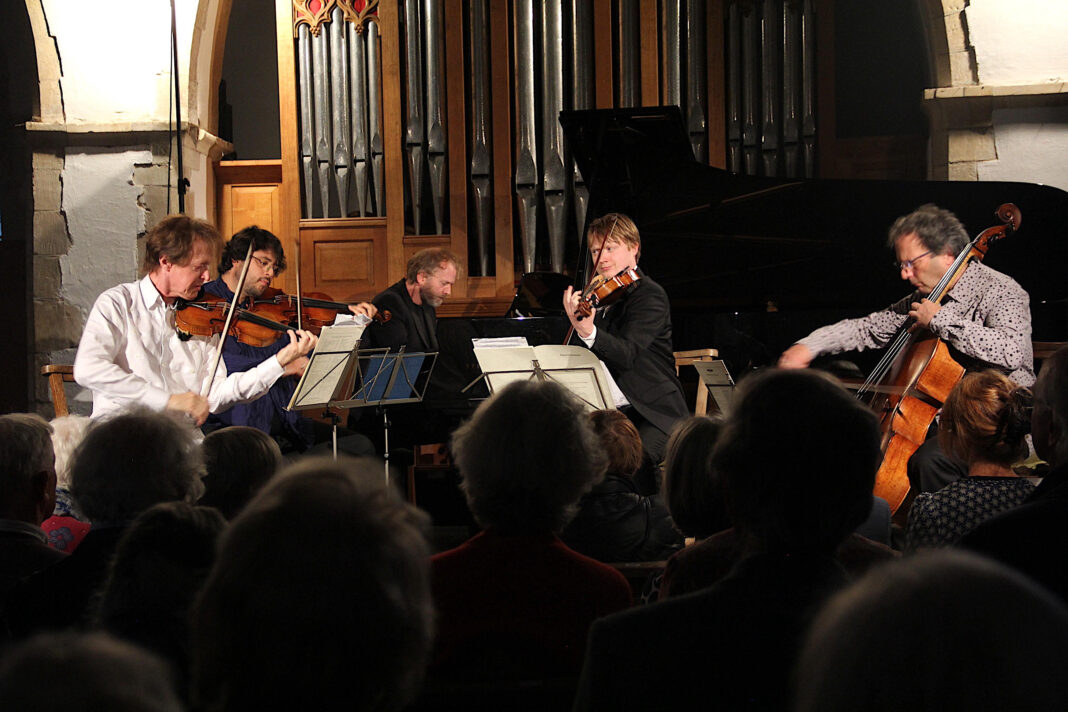I have been an audience member at the Peasmarsh Chamber Music Festival since 2003 and have written about it before; I regret to say that I am now approaching the end of my supply of superlatives. I call in aid the distinguished playwright Sir David Hare who, with his wife, the former fashion designer, now sculptor Nicole Farhi, attended a few years ago and commented in The Observer newspaper: “Peasmarsh, in late June, is a magical festival.”
Magical – that’s the word. I have often thought that the Festival’s co-directors, violinist Anthony Marwood and cellist Richard Lester, come to Peasmarsh Church some weeks before the Festival’s start, in late June as Hare says, and sprinkle huge quantities of a fairy dust of their own recipe to ensure a beautiful and successful event.
This is sort of true but the magic fairy dust recipe actually consists of weeks and months of preparation, helped by a team of brilliant supporters, many of them volunteers, hour upon hour of study to compile eight concerts, often thematically coherent, though not academically inflexible, and the utilization of psychological insight to invite as guest artists those who will combine most successfully.
Although much of this is almost indefinable, one only has to be in the audience, two or three feet from the end of a cello bow being manipulated with the utmost precision combined with great physical power to realise that to make things magical a very great deal of physical effort is essential. Someone, unimpressed by Beethoven’s music, once derided it as “sacks of potatoes” but that is surely a great compliment: no struggle will mean no magic.

It is not necessary or even desirable for me to write in detail about individual performances; suffice to say that all exhibited the very highest levels of technical skill, that all were communicated with what the poet Keats, writing of great poetry, called “the true voice of feeling” and in group performance, all were characterized by the most intelligent and unselfish team-work.
Thanks for all this and more go to Thomas Gould’s wonderfully well-drilled but still tremendously musical Britten Sinfonia with oboist Peter Facer and bassoonist Sarah Burnett. Also to the sensational Barbican String Quartet, who gave us three quartets, making sense for me, for the first time, of Berg’s Opus 3 and who were perfect support for the Young Composers, now consisting of five local primary schools who were a credit to the mercurial and brilliant Sam Glazer: educational outreach at its best.
Similar thanks go to two exceptionally gifted pianists, Alasdair Beatson and Chaeyoung Park, to violist Eivind Ringstad who makes discord profoundly expressive and makes poetry from all he plays, and to violinist Pablo Hernan Benedi, seemingly ubiquitous, who amazed with his period instrument interpretation of J.S.Bach’s Chaconne from the Partita No.2, making it a deeply meditative experience, rather than the showpiece it often becomes.
For analysis, we have had, for many years, the detailed programme notes of Richard Wigmore and this year the man himself, giving a witty and informative talk on Faure’s last work, his string quartet, this year 2024 being the centenary of the composer’s death. Richard and Anthony oversee all this and play like angels themselves throughout.

What is the Peasmarsh Chamber Music Festival like? Well, with beautiful venues, great company, excellent and plentiful food and drink, it is both the vitality and energy of the Kreutzer and the exquisite soulfulness of Schubert’s Fantasie in F minor, the bonkers hilarity of Ligeti’s Five Pieces for Four Hands and the moving beauty of Faure’s Elegie, the joyous and positive American quartet of Dvorak and the almost tuneless but vividly expressive Berg Opus 3.
It is the profound beauty of a Razumovsky slow movement and the boisterous energy of Haydn’s Sinfonia Concertante but this year it is, for me, the opportunity to discover, along, I’m sure, with many others, a truly great but little known masterpiece, one of the ‘unfamiliar’ pieces mentioned by Richard Lester in his remarks opening the Festival. This is Weinberg’s Piano Quintet Opus 18. Played with the utmost conviction by Messrs Marwood, Lester, Benedi and Ringstad together with Chaeyoung Park, on the Saturday evening, this was a Schumann-hearing-the nineteen-year-old Chopin and Keats looking into Chapman’s Homer moment: sounds profoundly expressive of the human condition, never before heard on earth when they were composed.
For a work to make such an impression on first hearing happens rarely and I soon learnt that not everyone shared my thoughts; some felt that the never-heard-before sounds should not have been heard at all, that, in short, the work was a hard-on-the-ear abomination. So a new and stimulating element came to the Festival: controversy and intense and sometimes heated discussion.
The Festival has a strange effect on time: no sooner has the Thursday evening concert concluded than, it seems, we are hearing the closing bars of the Schumann Piano Quintet Opus 44 drawing the whole thing to a close. Einstein said that time slowing when you are doing something you don’t want to do and accelerating when you are enjoying yourself was the essence of his theory of relativity. So one quality of the Peasmarsh Chamber Music Festival is that it proves Einstein’s theory without resorting to mathematics. Does this help us to describe the Festival of this or any other year? No, it doesn’t, because you can’t describe magic; you have to be there.
Image Credits: Walter Van Dyk , Kenneth Bird .



